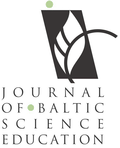INVESTIGATING THE CORRELATION BETWEEN STUDENTS’ PERCEPTIONS ON THE CONSTRUCTIVIST LEARNING ENVIRONMENT AND THEIR ACADEMIC SUCCESS IN SCIENCE COURSE WITH PATH ANALYSIS
| Title | INVESTIGATING THE CORRELATION BETWEEN STUDENTS’ PERCEPTIONS ON THE CONSTRUCTIVIST LEARNING ENVIRONMENT AND THEIR ACADEMIC SUCCESS IN SCIENCE COURSE WITH PATH ANALYSIS |
| Publication Type | Journal Article |
| Year of Publication | 2012 |
| Authors | Bas, G |
| Journal | Journal of Baltic Science Education |
| Volume | 11 |
| Issue | 4 |
| Start Page | 367-378 |
| Date Published | December/2012 |
| Type of Article | Original article |
| ISSN | 1648-3898 |
| Other Numbers | ICID: 1023449 |
| Keywords | Constructivist learning environment, correlation, Elementary students, science course |
| Abstract | The purpose of this study was to investigate the correlation between the perceptions on the constructivist learning environment and academic success of elementary students in science course with structural equation modelling. The correlative investigation model was adopted in the research. The sample of the research consisted of 195 students from six public elementary schools, chosen according to random sampling method. In order to answer the research question, “The constructivist learning environment survey” (Taylor, Fraser & Fisher, 1997) was used in the study. Also, the data in relation with students’ academic success in science course were gathered from their school report cards regarding the spring semester. In this research, LISREL 8.51 structural equation software was used in model establishing by using the observed variables. According to the findings obtained in the research, it was found out that the compatibility index results of the constructed equation model, the model-data compatibility was found out to be high enough [χ2/df=1.46; GFI=0.86; CFI=0.93; RMSEA=0.048; RMR=0.078; SRMR=0.056; NFI=0.81; NNFI=0.92] in the research. In the regression equa¬tion, it was found out that the variable best predicting students’ academic success in science course was the variable personal relevance in relation to the constructivist learning environment. On the other hand, it was understood that all five predictor variables that were included in the regression equation account for 76% of the overall variance of the academic success in science course in the research. |
| URL | http://oaji.net/articles/2014/987-1419169197.pdf |
| DOI | 10.33225/jbse/12.11.367 |
| Refereed Designation | Refereed |
| Full Text |
